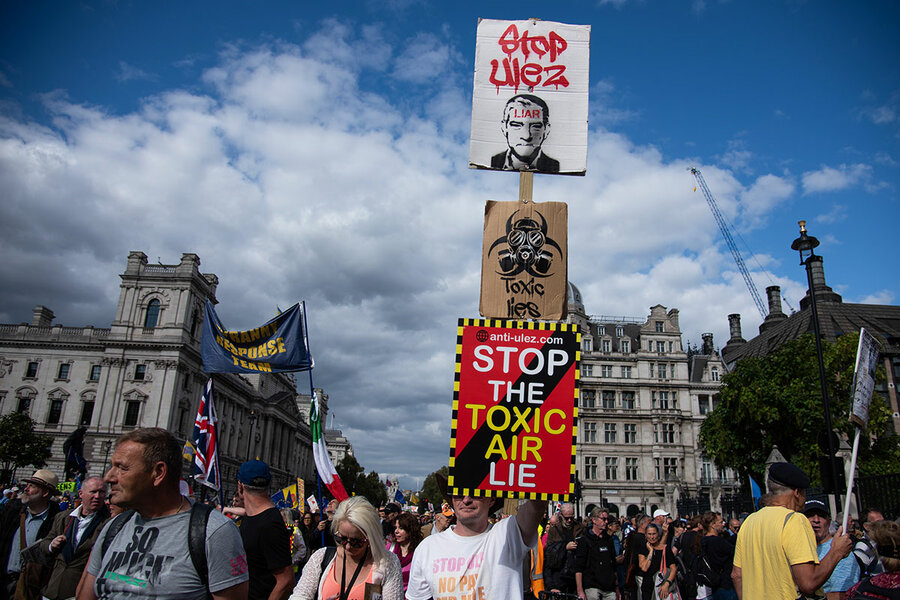In London’s clean-air fight, is burden falling too much on working class?
Loading...
| Dagenham, England
Until just recently, London’s ultra-low emissions zone (ULEZ) was just a spot in the city’s public transit-heavy center. But in August, it was expanded to wrap in all of London, including its transit-poor outer areas. “Clean air is a right, not a privilege,” London Mayor Sadiq Khan said.
But those who couldn’t afford to upgrade their vehicles to meet emissions standards were suddenly unable to drive to work, run errands, or visit family without paying a fee. The policy became a political football in a highly publicized by-election to fill former Prime Minister Boris Johnson’s parliamentary seat.
Why We Wrote This
A story focused onIn London, efforts to clean the air have become politically weaponized. But the electoral calculations mask real societal issues, such as whether antipollution burdens are falling too heavily on those who can’t afford to pay for it.
It’s a phenomenon that’s happening all over Europe with public health or climate change policies. The lesson learned, say policy experts, is that changes must be well communicated, fair, and properly funded, or they can become a public relations disaster and even work against their original goal.
“ULEZ is an illustrative example of the dangers intrinsic to addressing some of the environmental challenges we face,” says Jon Cruddas, a Labour Party member of Parliament. “Unless we handle it creatively and make sure that it doesn’t fall disproportionately on those least equipped to deal with it, then it could upend precisely what we want to achieve.”
Michael Andersen works out of his hulking, white Ford Transit van. It is roomy and robust, and he couldn’t deliver furniture or work in logistics without it.
Unfortunately, Mr. Andersen’s office on wheels puts out too many emissions for London’s ultra-low emissions zone (ULEZ), which was extended this year to include his working-class borough of Dagenham, nearly an hour east of central London.
“It’ll cost me £250 [$319] a month just to be able to drive my van,” says Mr. Andersen, explaining that driving a noncompliant vehicle in the ULEZ calls for a £12.5 ($16) daily fee. “But I’ll just have to drive it until I can afford a new van. I have to work, and I can’t use public transport.”
Why We Wrote This
A story focused onIn London, efforts to clean the air have become politically weaponized. But the electoral calculations mask real societal issues, such as whether antipollution burdens are falling too heavily on those who can’t afford to pay for it.
Until recently, the ULEZ was just a spot in London’s public transit-heavy city center. But in August, it was expanded to wrap in all of London, including its transit-poor outer areas. Pointing to the 4,000 annual premature pollution-related deaths that should be “reversed,” London Mayor Sadiq Khan said that emission-producing vehicles being driven and parked where people live was a key cause. “Clean air is a right, not a privilege,” he said.
But those who couldn’t afford to upgrade their vehicles were suddenly unable to drive to work, run errands, or visit family without paying that fee. And even though 9 out of every 10 vehicles were estimated to be ULEZ-compliant, the policy became a political football in a highly publicized by-election to fill former Prime Minister Boris Johnson’s seat.
It’s a phenomenon that’s happening all over Europe with public health or climate change policies. The lesson learned, say policy experts, is that changes must be well communicated, fair, and properly funded, or they can become a public relations disaster and even work against their original goal.
“It’s an issue of domestic and international solidarity, intergenerational solidarity, etc., to do everything we can to mitigate against environmental catastrophes,” says Jon Cruddas, a Labour Party member of Parliament whose district includes Dagenham. “But it must be a just transition. ULEZ is an illustrative example of the dangers intrinsic to addressing some of the environmental challenges we face. Unless we handle it creatively and make sure that it doesn’t fall disproportionately on those least equipped to deal with it, then it could upend precisely what we want to achieve.”
“It could ensure we are unable to meet this global and domestic challenge because we lack the agility to make sure that we can take the poor with us.”
Clean air becomes contentious
Public health policies weren’t typically controversial, says Gary Fuller, an air quality scientist affiliated with the Imperial College London. “Those of us in the air pollution arena didn’t really face the systematic misinformation and disinformation that prevails in the climate arenas,” he says. “We didn’t have people out there who are evidence deniers. That’s changed tremendously.”
Road traffic accounts for most of the nitrogen dioxide emitted in British towns and cities; cars bring pollution straight to where people live; and air pollutants have been linked to asthma, cardiovascular disease, dementia, and other ailments, according to the United Kingdom’s chief medical officer.
More than 300 low-emissions zones have been put in across Europe with little fanfare, says Dr. Fuller. And studies show local communities have benefited, with reductions in heart and circulatory problems, and fewer admissions to hospitals.
Yet there’s a cost-of-living crisis, and societies are more polarized and unequal than before, creating an environment where antipollution efforts can become unpopular quickly and weaponized by politicians. That’s what the Conservative Party did in the Uxbridge by-election, says Bob Ward, policy director at LSE’s Grantham Research Institute on Climate Change and the Environment. It was worried about dropping poll numbers and also felt pressure from fringe climate change critics on its right, and so attacked the ULEZ as a Labour policy – despite it originally being a plan announced by Mr. Johnson when he was mayor of London.
In addition, the ULEZ has raised questions about who should bear the brunt of its cost. Health- and climate-related policies are typically based on “polluter pays” principles to incentivize people to change their behavior, says Mr. Ward. With the ULEZ, the idea is not to collect money, but to spur owners of polluting vehicles to upgrade to cleaner ones.
But Mr. Ward says that the burden of the ULEZ has fallen too heavily on working-class vehicle owners who are struggling to make the needed upgrades. Even with a trade-in payment implemented by the London mayor’s office, the maximum subsidy was only £2,000 for cars and motorcycles, and there were all kinds of exceptions that vehicle owners found confusing and exclusionary. (Larger vehicles like vans do get a larger trade-in payment, which was increased in August.)
“There was no pushback against the original ULEZ,” says Mr. Ward. “The public will support policies if they think they’re fair, and fair means you help people do the right thing. You don’t force them into an impossible choice. Against a backdrop of high prices, with people particularly on low incomes struggling with the cost of living, it would have been smarter for government to properly subsidize.”
The social justice angle also complicated the rollout of the ULEZ, says Tim Dexter, policy manager of Asthma and Lung UK, a British charity. Air pollution impacts poor people more, as they are more likely to live near major thoroughfares and industrial sites.
“These schemes do work, but we need to be a lot more honest across the spectrum about the amount of support that’s required to be able to do this,” says Mr. Dexter. “We need a fair transition. We’ve got the solutions, we know the tools, and it’s been done elsewhere in the U.K. and other countries. And tackling air-pollution impacts is the first line of the battle against climate change.”
“It’s just ill-thought out”
Back in Dagenham, commuters file out of the subway station and wait in bus lines on a Monday afternoon.
Almost everyone has an opinion about the ULEZ. This working-class neighborhood sits about a 50-minute metro ride east of central London. Ford Motor Co. moved a plant here back in the 1930s, and for a time Dagenham was home to Europe’s largest car plant, a British weapons manufacturer, and other industrial sites. Today it has one of the highest child poverty rates in London.
Many locals don’t own cars, but some do. Spencer Landers, a railway worker, says he occasionally drove an older neighbor to the grocery store who couldn’t immediately upgrade his car. “He’s had to scrimp and scrape all his savings. I’ve took him down about a mile and a half to where he does his shopping,” says Mr. Landers. “He’s just retired and he’s had to try to piece together whatever money he can to get a new car.”
Terry Goodes was happy to call the ULEZ and the London mayor a few choice expletives. The retired carpenter is recently widowed and has thought about getting back to work. But coming up with the money to comply with the ULEZ might put up a roadblock.
“Most working-class people are at the brink of what they can do financially, you know?” says Mr. Goodes. “It’s just ill-thought out. The cost of living and generally the state of things – and this just didn’t help. It’s as black-and-white as that, really.”










